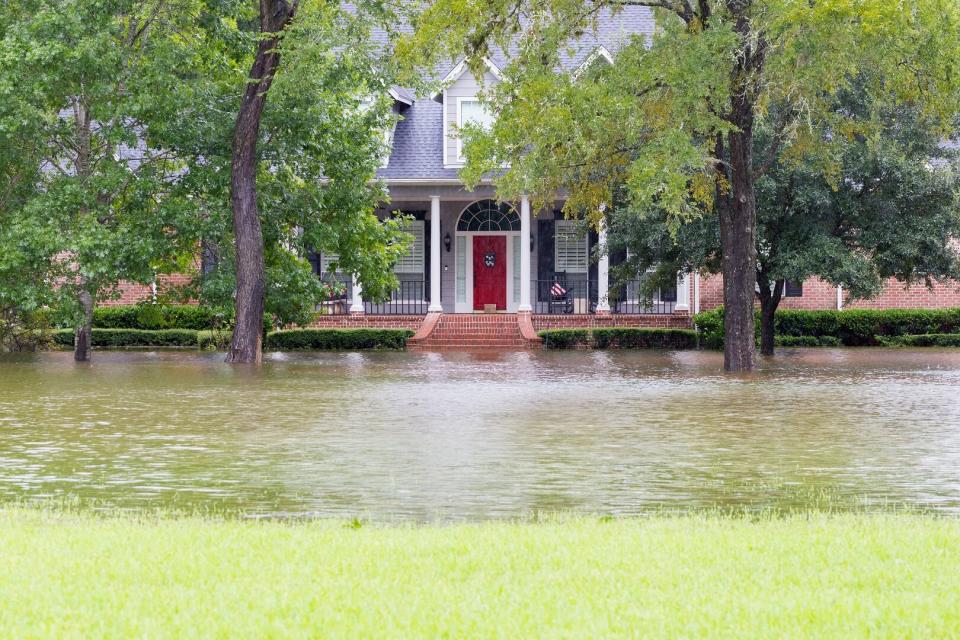How to Talk to Kids About Natural Disasters
When tragic events occur, such as wildfires or hurricanes, it can be difficult for kids to cope. A natural disaster is a stressful event for a person of any age, but for children, it's much more anxiety-provoking. That's because they don't understand what happened and they don't know what's going to happen, which is frightening to them, says Maneesh Kumar, D.O., a pediatrician at Memorial Hermann Southwest Hospital, in Houston.

michelmond/Shutterstock
Whether a storm directly affected your family or a tornado hit three states away, knowing what to say can help make this tough time easier. Follow these tips to learn how to talk to kids about natural disasters.
Explain What Happened
You may think it's better to shield your child from the disaster if it didn't happen in your area. But elementary students might catch a glimpse of the news coverage or hear classmates talking about it. Rather than trying to keep it from them, find out what they already know, experts suggest. Then you can clear up any mistruths and, in kid-friendly terms, explain what happened. For instance, if there was an earthquake, you could say the rocks deep under the ground moved and caused the ground to shake. You can give older kids more details or help them find a book or reputable website on the topic so they get a better understanding.
Answer Questions
Once you explain the incident, expect your child to have questions: Can't the firefighters pour water on the forest to put out the fire? Did people get hurt? Try to answer honestly, but keep things age-appropriate. If a question stumps you, admit you don't know the answer and offer to find it. Both of you can work together to find the information. Just be careful of scary images when doing online searches.
Also, don't worry if your child doesn't have any immediate questions. They may just be sorting through their feelings, and the inquiries will come later. Regardless, let them know you'll answer any questions they might have down the road.
Offer Comfort
After experiencing a disaster, whether firsthand or through media images, kids tend to worry about their family's safety or fear that the event will happen again. Restore your child's sense of security and show them you're prepared by going over the disaster plan and pointing out the emergency kit. Keeping a cool demeanor, assure them you'll do all you can to keep them safe. If you're overwhelmed with grief or in a panicked state, they will mirror your emotions and behaviors.
Look for Silver Linings
Of course, if you're standing in a pile of debris that was once your home, it can be difficult to put on a hopeful front. However, even in such tragic circumstances, it's better to show signs of optimism rather than despair. "Your child looks to you for cues on how to think about this event and make it a part of his or her life experience," says Deborah Gilboa, M.D., a family physician and author of Teach Resilience: Raising Kids Who Can Launch! "If you focus on the positive aspects—who wasn't hurt, what wasn't lost—then your child will make that part of their dialogue as well, learning not only how to deal with this tragedy but also how to look at future obstacles," she says.
So instead of dwelling on the damage to your home, say: "Even though I'm sad about the house, the good news is that it can be rebuilt. And what matters most is that our family is safe and we're together."
Maintain Normalcy
Try returning to familiar routines as much as possible after the disaster. Even if you spend a few days (or weeks) in a hotel or at a relative's home, you can still do some of the things you did before. If you always read your child a bedtime story, for instance, continue that ritual. Maintaining these simple routines and others, such as mealtimes and naps, will give your child a sense of normalcy, which helps reduce anxiety.
Monitor Media Use
Although you'll want to keep up with the news about the disaster, limit your child's exposure to the media coverage. Images of torn-down homes, injured people, or captured footage of the event can be terrifying to children. In addition, many kids don't realize that news outlets report the same topics repeatedly. So when they see or hear a story, they may think it's happening over and over again.
Look for Signs of Stress
It's common for kids to show signs of anxiety or depression after a disaster. Children who are anxious may act out, have temper tantrums, or change their sleeping patterns, appetites, behavior, or moods, Dr. Kumar says. Your child may also be afraid of things that previously caused no fear. For example, after a hurricane, they may get frightened whenever it rains. Those things are normal as long as the emotions aren't so intense that they keep your child from their daily functions, Dr. Kumar says. "If you notice a difference in the child's ability to do what he or she otherwise would've been doing on a regular basis, it's probably time to seek help," he says.

